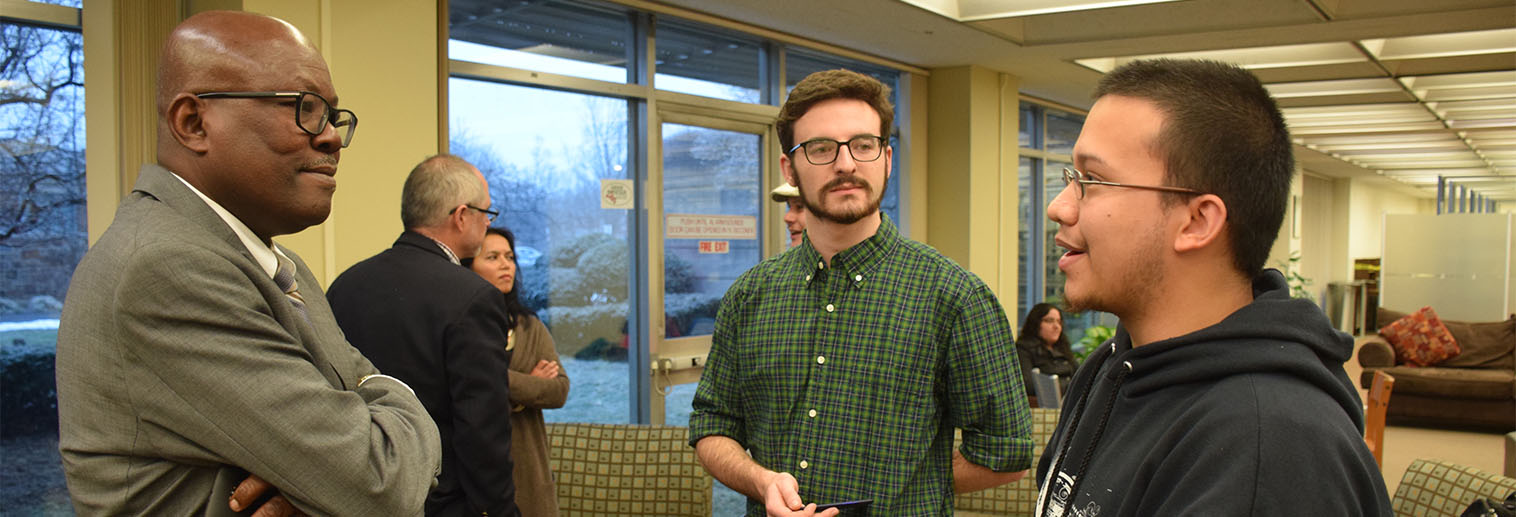Man of the People
By Jonathan Clark ‘16
Poverty--a single word with an overarching vastness. It lies at the root of many issues that plague millions today. Its prevalence and associated challenges compel the Moravian University community to bring more awareness to the poverty epidemic, and further support the movement towards cultivating equality among all people. Thus, on February 9th 2016, the University extended an invitation to prominent human rights lawyer, Mario Joseph, who graced us with his illuminating presence. An honorary degree for his service on behalf of his homeland, Haiti, was presented to him by President Byron Grigsby at the end of an eventful day.
Narrow your focus in on Mario Joseph just for a split second, and it becomes immediately apparent that here is a man who understands the value in living a life beyond himself, for others. Whether at the dinner prepared on behalf of Joseph, the screening of his film “Baseball in the time of Cholera,” or at the lecture in which he voiced his vision for bringing justice to the people of Haiti, Joseph’s presence was captivating. Always scanning the room with his dense gaze, quietly processing the conversations taking place around him, postured upright with an aura of humbleness and a gentle smile perched on his lips.
Oftentimes, within our blindingly fast-paced and ever-evolving global community, we overlook the importance of remaining vigilant on behalf of those around us. Yet, tucked away in the back of our thoughts, we know that the individual lives we silently encounter every day should somehow matter more to us, because without our interaction with them, how would our lives have any purpose?
Back in 2010, as if a devastating earthquake that killed nearly 200,000 people wasn’t enough of a catastrophic event, Haiti had very little time to salvage all that had been lost before having to transition into dealing with a major epidemic--the cholera outbreak. The disease rapidly spread across the country, infecting a multitude of people, as a large portion of Haiti’s sources for drinking water became contaminated. Suffering became the new norm, as adults and children helplessly watched one another experience the agony of contracting the disease either to endure or eventually die.
Cholera had not been documented in Haiti for more than 100 years. With speculation swirling as to how it burst onto the scene, those diligently seeking to find the right answers, as well as health experts, were perplexed; however, the deeper that individuals like Joseph dug, the more the truth started to unveil itself. Ultimately, it was discovered that peacekeeping troops, deployed to Haiti by the United Nations, had carried the disease over from Nepal. And yet, while the United Nations was notified of their responsibility and how they could assist in cleaning up the mess they created, they chose to deny any role in the outbreak.
Hence, it is necessary to understand Joseph’s critical efforts in negotiating for years between the people of Haiti and the United Nations. He has relentlessly pressed forward with a steadfast conviction on behalf of seeing his people treated with fairness, against the faces of corrupt power and the imminent threat of danger posed to his own life on a daily basis. “I am not afraid,” he remarked during a Q&A session. “In Haiti, we know death. We live death every day.” Joseph has brought global awareness to the malfeasance over the cholera outbreak by winning his case in the court of public opinion. He now aims to secure compensation for the damages and turmoil endured by the people of Haiti on the international level of the judicial system. Every day, Joseph and those fighting alongside him to bring justice to the people of Haiti continue to receive support from a wealth of people around the world who are now aware and want to see this issue find resolve.
Joseph has shaped himself into a man of principle and professionalism. He has cultivated a culture of influence and a vision to recruit faithful comrades willing to fight for social justice. Most importantly, he is an activist on behalf of millions of families and individuals in Haiti who rely on him to foster a significant level of change in regards to issues of inequality, so that they, too, can have a chance at the freedoms innate to the human experience.
Despite the many possibilities we are presented with today, may we never take for granted those who have chosen to dedicate their lives for the greatest of purposes, which has always been and will always be sacrifice for the betterment of others. Mario Joseph is a model of excellence not only for his representation of the people of Haiti but of the impoverished everywhere who have no voice in their destiny. For his duty and movement to serve others, he deserves to be recognized as a man of the people but also a heroic figure.

